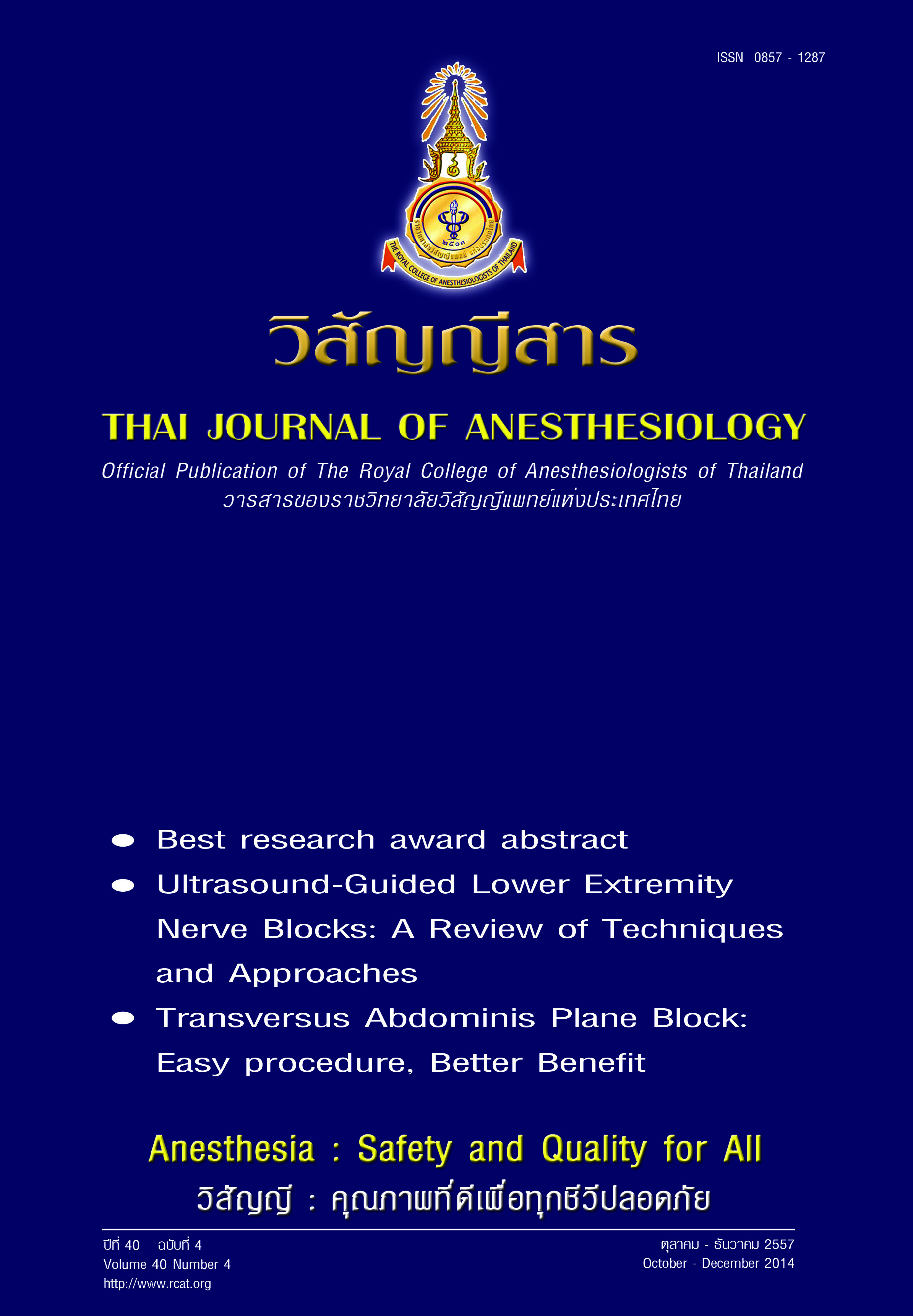Causes of surgical cancellation of elective surgery in Srinagarind hospital
Main Article Content
Abstract
Background: Cancellation of elective surgery made an inefficient use of operating room time and a waste of resources. It can also affect to patients and their families in terms of cost and emotional involvement.
Objectives: To determine rate and reasons for cancellation of elective surgery at Srinagarind Hospital.
Methods: This prospective descriptive study in elective surgical patients whom were scheduled between June 1, 2012 and September 30, 2012 at Srinagarind Hospital. The total number of patients as well as the number of cancellation cases was daily recorded. The reasons for cancellation were explored by interviewing surgeons, anesthesiologists and scrub nurses who were responsible in the cancellation case. The reasons were divided into 3 groups according to the main factors; group 1: patient’s factor, group 2: doctor’s factor and group 3: hospital service’s factor.
Results: Cancellation was recorded in 81 of 4,016 patients scheduled for elective surgery which resulted in 2.02% (95% CI: 1.6%-2.5%) cancellation rate. Most of the cases were from department of general surgery. The main reasons for cancellation were from doctor 87.7%, from patients 11.1% and from hospital service 1.2%. List overrun was the most common reason in the doctor group while, in the patient group, the reason were associated medical problems which were fever and infection.
Conclusions: The cancellation rate was 2.02% at Srinagarind Hospital. List overrun was the most common reason. Although the cancellation rate was low in comparison with the reported rates worldwide, the reductions might be achieved by appropriate strategies to prevent unnecessary cancellation.
สาเหตุของการเลื่อนผ่าตัดกรณีไม่เร่งด่วนของโรงพยาบาลศรีนครินทร์
บทนำ: การเลื่อนผ่าตัดผู้ป่วยกรณีไม่เร่งด่วน ทำให้สูญเสียเวลาและค่าใช้จ่ายทั้งต่อผู้ป่วย แพทย์ รวมถึงโรงพยาบาลและยังส่งผลกระทบต่อจิตใจของผู้ป่วยและญาติด้วย ซึ่งหากสามารถทราบสาเหตุและสามารถแก้ปัญหาได้จะทำให้ลดการสูญเสียเวลาและค่าใช้จ่ายได้มากขึ้น
วัตถุประสงค์: เพื่อศึกษาอัตราและสาเหตุของการเลื่อนผ่าตัดผู้ป่วยกรณีไม่เร่งด่วน
วิธีการศึกษา: ศึกษาในผู้ป่วยที่มารับการผ่าตัดกรณีไม่เร่งด่วนในเวลาราชการของโรงพยาบาลศรีนครินทร์ คณะแพทยศาสตร์ มหาวิทยาลัยขอนแก่น ในช่วงระหว่างวันที่ 1 มิถุนายน ถึงวันที่ 30 กันยายน พ.ศ. 2555 โดยเก็บข้อมูลจากจำนวนผู้ป่วยที่มีชื่อบรรจุในตารางการผ่าตัดและจำนวนผู้ป่วยที่ถูกเลื่อนผ่าตัดจำแนกตามแผนกการผ่าตัดในแต่ละวัน และบันทึกเหตุผลของการเลื่อนผ่าตัด โดยการสัมภาษณ์แพทย์ผ่าตัด วิสัญญีแพทย์หรือวิสัญญีพยาบาล และพยาบาลห้องผ่าตัดผู้รับผิดชอบผู้ป่วยที่มีการเลื่อนผ่าตัด แบ่งเหตุผลเป็น 3 ปัจจัยคือ 1.จากผู้ป่วย 2.จากแพทย์ 3.จากระบบบริการของโรงพยาบาล นำข้อมูลที่ได้มาวิเคราะห์โดยใช้สถิติเชิงพรรณนาแบบไปข้างหน้า แสดงผลในรูปร้อยละ
ผลการศึกษา: ผู้ป่วยที่มารับการผ่าตัดกรณีไม่เร่งด่วนในช่วงเวลาที่ทำการศึกษาจำนวน 4,016 ราย ถูกเลื่อนผ่าตัดจำนวน 81 ราย คิดเป็นร้อยละ 2.02 (95% CI: 1.6%-2.5%) โดยผู้ป่วยที่มารับการผ่าตัดแผนกศัลยกรรมทั่วไปมีอัตราการเลื่อนผ่าตัดสูงสุดคิดเป็นร้อยละ 42 เหตุผลของการเลื่อนผ่าตัดที่พบมีสาเหตุจากแพทย์มากที่สุดจำนวน 71 ราย (ร้อยละ 87.7) จากตัวผู้ป่วยจำนวน 9 ราย (ร้อยละ 11.1) และจากระบบบริการของโรงพยาบาลจำนวน 1 ราย (ร้อยละ 1.2) และเหตุผลที่ทำให้แพทย์เลื่อนผ่าตัดมากที่สุดคือ แพทย์ผ่าตัดไม่ทันตามตาราง
สรุป: อัตราการเลื่อนผ่าตัดผู้ป่วยกรณีไม่เร่งด่วนพบร้อยละ 2.02 โดยสาเหตุส่วนใหญ่มาจากแพทย์ผ่าตัดไม่ทันตามตา


